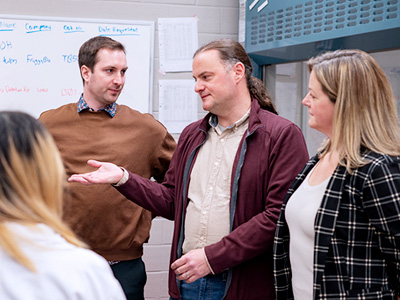Can we fix errors in our genetic blueprint that lead to debilitating disorders like Huntington's disease?
How can we better support newcomers to Canada as they encounter mental health challenges?
These questions are driving two of the 18 projects at Schulich Medicine & Dentistry that received funding from the Canadian Institutes of Health Research (CIHR) through its latest project grants competition.
Along with researchers in the Faculty of Health Sciences and the Faculty of Science, Western projects received a total of $17.8 million in CIHR grants.
"Our success with CIHR funding underscores Schulich Medicine & Dentistry's commitment to research excellence and our increasing global impact in major research areas, such as cancer, infectious disease and brain health," said Robert Bartha, vice dean of research and innovation.
"We look forward to the important discoveries and health-care advances that will emerge from this significant investment."
Two grants were also awarded to researchers in the Faculty of Health Sciences, including $929,475 to kinesiology professor Lindsay Nagamatsu. Also the Canada Research Chair in Activity for Brain Health and Aging, Nagamatsu will study the use of semaglutide - a diabetes medication that's gained popularity as a weight-loss aid with the rise of Ozempic and other drugs in the family - and resistance exercise to address cognitive decline in older adults with type 2 diabetes.
Obidimma Ezezika, a professor the School of Health Studies, and his team received $100,000 to investigate how to strengthen pandemic vaccine preparedness in Africa by studying lessons from countries with high and low COVID-19 vaccination rates.
Mathematics professor Lyle Muller, in the Faculty of Science, received $692,325 for his project analyzing a specific form of brain activity during sleep and its role in memory consolidation.
Personalized therapies for Huntington's disease, other disorders
A tiny molecule may be the key to fixing genetic mutations with less risk and more precision than traditional gene therapy, offering hope to patients with debilitating genetic diseases, such as Huntington's.
Biochemistry professor Patrick O'Donoghue was recently named the inaugural endowed Huntington Society of Canada Research Chair - the first-of-its-kind in North America.

Patrick O'Donoghue (centre) and his research team are investigating the potential of tRNAs to correct or suppress genetic mutations. (Megan Morris/Schulich Medicine & Dentistry)
He is striving to improve outcomes for Huntington's patients and accelerate life-changing treatments for the hereditary brain disorder. To date, there are no treatments available to halt or reverse its disabling physical, cognitive and emotional symptoms.
But with $1.1 million in new CIHR funding, O'Donoghue is hoping to change that.
He's investigating the potential of transfer ribonucleic acid (tRNA) to correct or suppress mutations in protein coding genes. tRNAs are adaptors that read genetic instructions to help build and assemble proteins - one of the key building blocks of the human body.
But the genes encoding tRNAs can have mutations that cause the code to be read differently. Some tRNAs also have the potential to translate a disease-causing gene product into a healthy protein.
O'Donoghue is tapping into these functions, using tRNA therapies to target mutations in Huntington's disease (the basis of a recent paper published in Molecular Therapy Nucleic Acids), amyloid lateral sclerosis (ALS) and Duchenne's muscular dystrophy.
"tRNA provides personalized and mutation-specific therapies to treat these diseases, for which no cures currently exist," he said. "This approach also has the potential to correct mutations that cause thousands of genetic disorders."
Improving mental health services for newcomers
"The higher rates of psychotic disorders among migrant groups have been described as a public health tragedy," said Kelly Anderson, professor of epidemiology and biostatistics at Schulich Medicine & Dentistry. "These inequities have persisted for nearly a century with little progress toward prevention."

Kelly Anderson is using population data to better understand psychosis among migrant groups. (Brick House Productions)
Anderson, Canada Research Chair in Public Mental Health Research, is using population data from Ontario's health system to better understand psychosis among first-generation migrant groups.
With $604,352 in new CIHR funding, she will be analyzing a range of factors, including outcomes in care, such as hospitalizations, how neighbourhoods and geographic location impact psychosis risk and the unique experiences and needs of migrant populations.
This research will be the most comprehensive Canadian study to date focused on the disparities faced by migrant groups, building on Anderson's large body of work on mental health service delivery.
"Our findings will provide evidence and strategies that can be implemented to improve the mental health of newcomers to Canada," she said.
CIHR Project Grants
Kelly Anderson, Schulich Medicine & Dentistry
Understanding the Evolution of Psychotic Disorders and Related Outcomes among First-Generation Migrant Groups
Eric Arts, Schulich Medicine & Dentistry
Development of an HIV-1 vaccine with enhanced CD4 engagement and inducing broadly neutralizing antibodies
Lauren Flynn, Schulich Medicine & Dentistry
Delivery of induced pluripotent stem cells in cell-instructive composite hydrogels for nucleus pulposus regeneration
Paula Foster, Schulich Medicine & Dentistry
Developing Magnetic Particle Imaging (MPI) Lymphography
Douglas Hamilton, Schulich Medicine & Dentistry
Resetting the Chronic Skin Wound Edges: Investigating Contact Guidance and Suppression of Oxidative Stress Signaling to Enhance Keratinocyte Migration in Skin Re-epithelialization
David Heinrichs, Schulich Medicine & Dentistry
The intersection of nutrient sensing and virulence potential in Staphylococcus aureus
Wataru Inoue, Schulich Medicine & Dentistry
Elucidating the roles of the prefrontal cortex in behavioural selection under stress
Marlys Koschinsky, Schulich Medicine & Dentistry
Mechanisms of hepatic biosynthesis and catabolism of lipoprotein(a)
John McCormick, Schulich Medicine & Dentistry
Staphylococcal superantigens at the commensal-pathogen interface
Ravi Menon, Schulich Medicine & Dentistry
Benchmarking SASS: a new paradigm for laminar functional magnetic resonance imaging
Lyle Muller, Faculty of Science
Analyzing neural traveling waves in sleep spindles as a biological mechanism for human memory consolidation in sleep
Lindsay Nagamatsu, Faculty of Health Sciences
The use of semaglutide and resistance exercise to combat cognitive decline in older adults with Type 2 diabetes
Patrick O'Donoghue, Schulich Medicine & Dentistry
Precision therapeutics for genetic disorders with transfer ribonucleic acids
Vania Prado, Schulich Medicine & Dentistry
The interplay of cholinergic dysfunction and APOE4 in Alzheimer's disease
David Seminowicz, Schulich Medicine & Dentistry
Peak Alpha Frequency and Pain Sensitivity
Trevor Shepherd, Schulich Medicine & Dentistry
Evaluation of pharmacologic LKB1 inhibition as a new therapeutic strategy against ovarian cancer metastasis
CIHR Project Grants funded via London Health Sciences Centre Research Institute
Drs. Habib Khan, Ratika Parkash, Anthony Tang
Resynchronization for Ambulatory Heart Failure Trial in patients with Chronic Atrial Fibrillation - Pharmacological rate control vs. Pace and Ablate Conduction System Pacing
Dr. Pavel Roshanov
Bleeding Reduction in Acute and Chronic Kidney Patients Having Surgery - Vanguard Phase
CIHR Priority Announcement
Obidimma Ezezika, Faculty of Health Sciences
Strengthening Pandemic Vaccine Preparedness in Africa: Lessons from African countries with high and low COVID-19 vaccination rates
Jibran Khokhar, Schulich Medicine & Dentistry
Sex Differences in Cannabis Use as a Risk Factor for Schizophrenia: A Role for Microglia?
Steven Laviolette, Schulich Medicine & Dentistry
Understanding the Impacts of Prenatal Cannabinoid Exposure on the Prefrontal-Hippocampal Network and Developing Neurolipidome: Implications for Long-Term Neuropsychiatric Risk and Intervention Strategies
Caroline Schild-Poulter, Schulich Medicine & Dentistry
Investigating the molecular pathology of WDR26 deficiency
Krishna Singh and David Hess, Schulich Medicine & Dentistry
Novel Mechanisms in Doxorubicin-induced Cardiomyopathy






